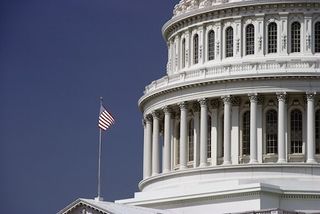USA Freedom Act Vote Targeted for June 2

WASHINGTON — According to Sen. Richard Burr (R-N.C.), chairman of the Senate Intelligence Committee, the USA Freedom Act will be reintroduced with three amendments, the first essentially a replacement bill with two changes, plus a couple of amendments to that new bill.
The amendments will likely come on Tuesday (June 2), with Burr's hope that the measure can pass Tuesday afternoon.
If the amendments are agreed to, the House will have to revote the bill, which was passed without amendments in that body under the threat that any changes would have killed it.
The National Security Agency’s authority to conduct bulk metadata surveillance under Section 215 of the USA Patriot Act expired on May 31, and will have to wait at least another day before it is revived in a different form in the USA Freedom Act, if it passes, as most expect.
The substitute bill’s amendments would do several things, including requiring telecom companies to give the government six months notice of any change in their data retention policies. One key change the USA Freedom Act makes to the Section 215 authority is that telcos, not the government, will hold the data, and are under no mandate to retain it for longer than the normal business case of 18 months to two years.
A second amendment deals with how telcos query the data when the government asks for it.
The other two amendments would: 1) extend from six months to 12 months the transition from the old method of the government scraping and storing the data to the telephone companies keeping it for query (subject to a court order); and 2) change the language related to filing friend of the court briefs. (Burr would have extended the storage transition to 24 months.)
Multichannel Newsletter
The smarter way to stay on top of the multichannel video marketplace. Sign up below.
On the Senate floor, Sen. John Cornyn (R-Texas) said the amendments are "positive, common-sense improvements" that will strengthen the bill, though he would have preferred a full extension of Section 215. He said the bill balances security and privacy as the government works on a longer-term solution.
Burr said the Patriot Act authorities were one of the tools created after the Sept. 11, 2001 terrorist attacks, when an inability to link cellphone calls between terrorists was cited as an intelligence failure that needed correcting.
Burr said he hoped that the House could act and the bill could be approved by end of day Tuesday. In the meantime, the NSA bulk data cannot be queried, given the sunset of the authority.
Time was of the essence so NSA could get ahead of the next potential attack, Burr said. He said the amendments would not "blow up" the legislation.
Contributing editor John Eggerton has been an editor and/or writer on media regulation, legislation and policy for over four decades, including covering the FCC, FTC, Congress, the major media trade associations, and the federal courts. In addition to Multichannel News and Broadcasting + Cable, his work has appeared in Radio World, TV Technology, TV Fax, This Week in Consumer Electronics, Variety and the Encyclopedia Britannica.

